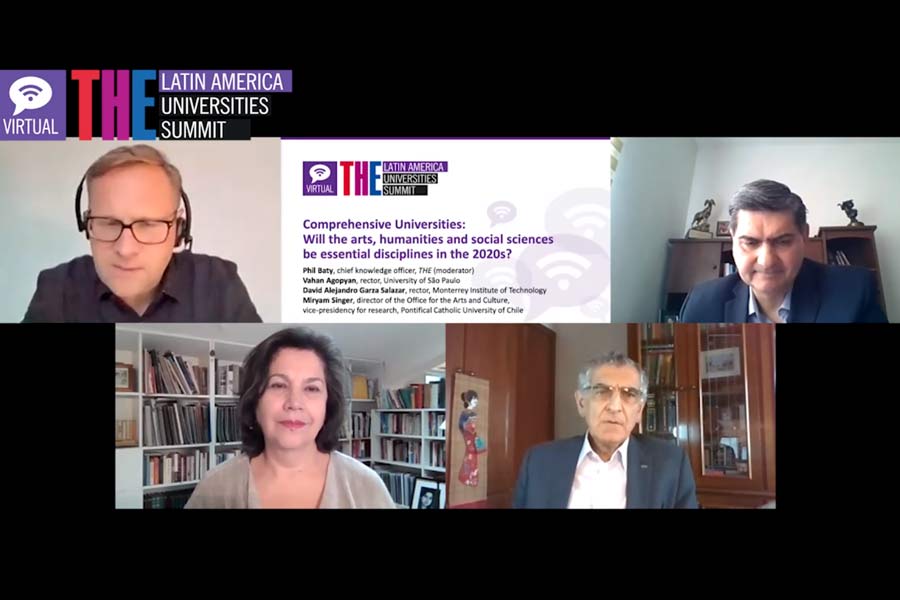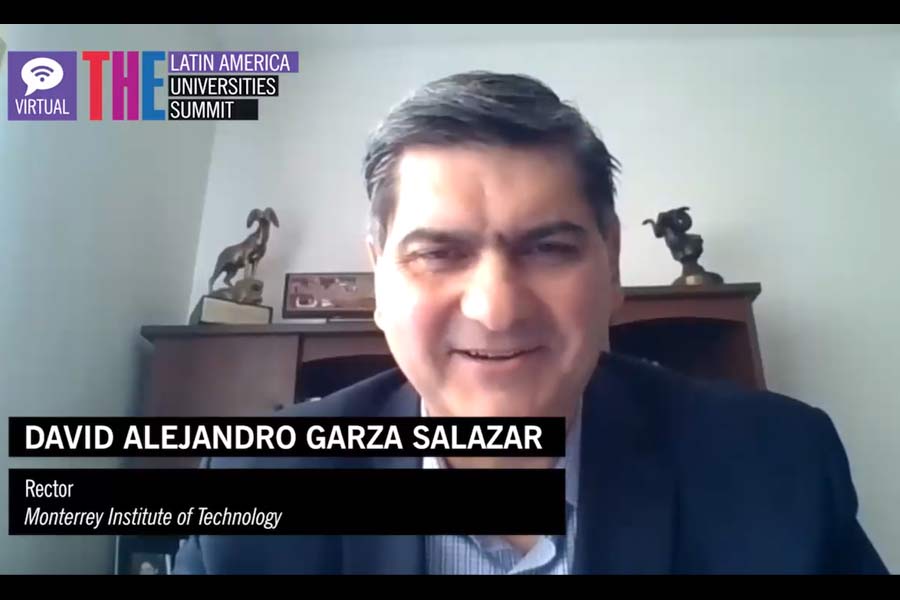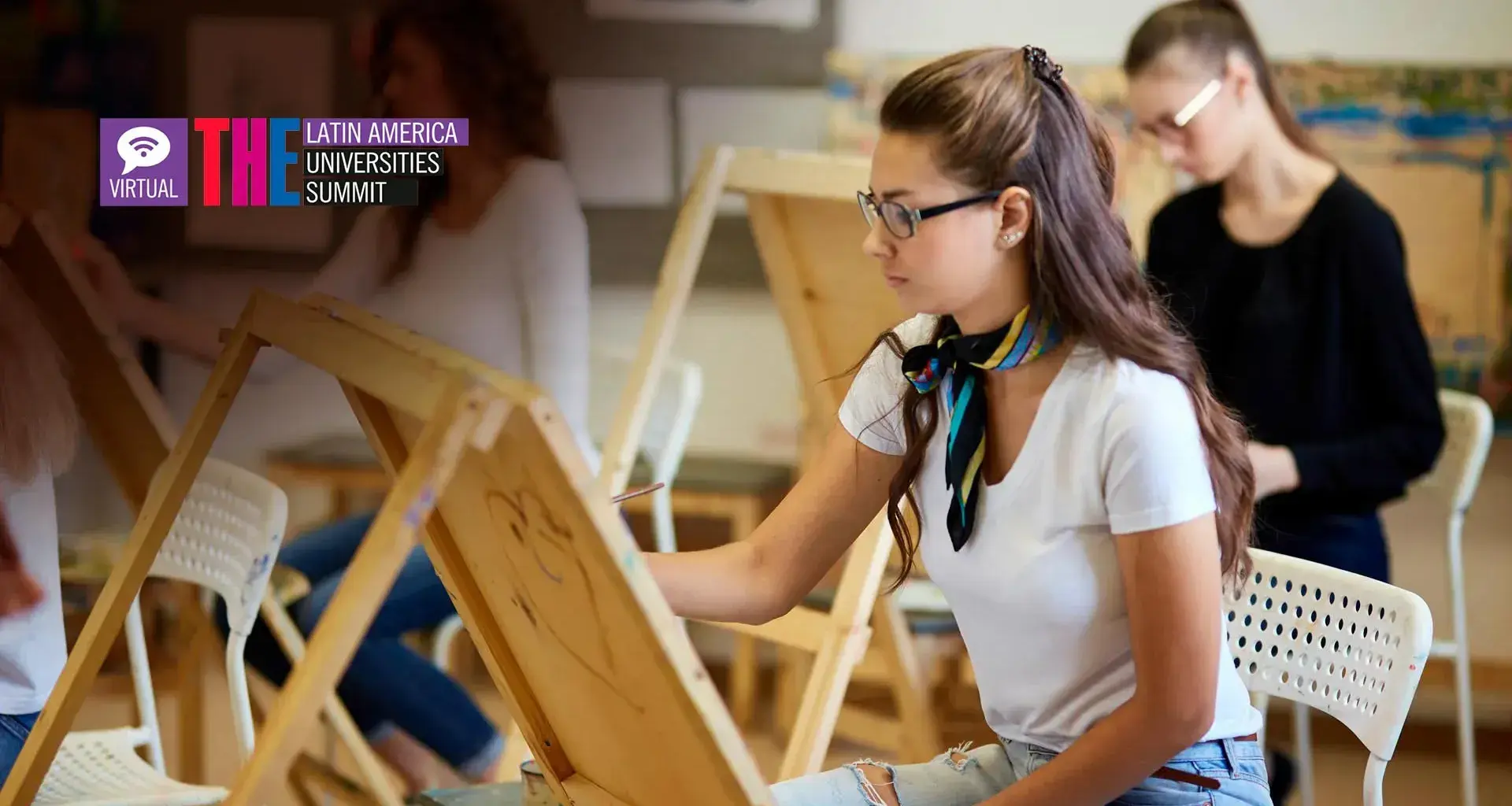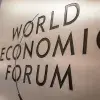In a Times Higher Education (THE) panel with Latin American university leaders, the rector and executive president of Tec de Monterrey, David Garza, said that humanities, social sciences and the arts help to develop the leaders that the world will need in the post-COVID era.
“Humanities and social sciences graduates stand out for their skills, for seeing the whole picture and connecting the dots in complex situations, and for their analytical thinking,” he said.
The rector participated in a panel entitled “Comprehensive Universities: Will the arts, humanities and social sciences be essential disciplines in the 2020s?” during the Latin America Universities Summit.
Garza shared his ideas with Vahan Agopyan, Rector of the University of Sao Paulo, and Miryam Singer, Director of the Office of Art and Culture and Vice President of Research at the Pontifical Catholic University of Chile. Phil Baty, Chief Knowledge Officer at THE, was the moderator.
Vahan Agopyan said that universities should have strong groups of people from the humanities and the arts during the pandemic, because they are important to keeping society in the best possible condition.
During her participation, Miryam Singer said that the most important aspect of the arts is that they address people’s spiritual capacity.
“The arts provide an emotional construct that provides consistency for society.”

Garza said that emotional intelligence and analytical and creative thinking are the characteristics of graduates from such disciplines, citing a study on the leadership skills which will help society adapt to the challenges produced by the COVID-19 pandemic.
He also said that there are social issues and challenges which require the debate and reflection associated with these disciplines, including misinformation and fake news.
“These are issues which we face as a society, and which make disciplines such as humanities, social sciences, and the arts even more relevant.
“For example, there’s a lot of science we need to do regarding environmental issues. However, these problems also require an understanding of behavioral changes, narratives, and collaborative meetings. Particular skills are needed, and these areas help with that.”
He added that universities must eradicate the “utilitarian vision” of education as useful only for finding a job, but rather to see it as a way to generate social change through leadership and using these skills.
“We need to defend the idea that education is not just about getting a job. Education is for both shaping one’s life and improving society,” said the Tec rector at the THE Latin American Universities Summit.
EXPECTED TRENDS
Garza revealed three trends that could cause greater demand for these areas at educational institutions, particularly those responsible for developing leaders in those fields.
“One is the industrial revolution. With the advent of artificial intelligence and robotics, many jobs will become automated, but they will still require human skills such as creativity, empathy, and design.
“We’re seeing many technology companies recruiting graduates from these fields, because they have to involve aspects of those areas in the algorithms they’re creating,” he shared.
The second factor he mentioned was a change in the “COVID generation”, referring to young people who are currently in junior high or high school.
“What effect will (the pandemic) have on them in terms of their attitude, their habits, their values? I think there will be a change in which they will find other ways of understanding what is really important for the world”.
Finally, he said he sees a greater need for leaders with skills in these fields.

TEC SUPPORT FOR THESE AREAS
Garza spoke of the Tec as a comprehensive university which, in addition to focusing on engineering, business and STEM fields, includes courses for developing all students’ skills in these areas as part of the Tec21 Educational Model.
This model includes challenge-based learning, flexible learning, providing memorable university experiences, and inspiring teachers. The new model was fully implemented in August 2019.
“What’s interesting is that this model includes engineering and business students working on challenges addressing multidisciplinary contexts.
“We have faculties in different areas of the humanities, arts, and social sciences working with engineers to develop challenges in these areas and expose students to them,” he explained.
He shared that the institution has defined the basic skills and abilities that all students must develop throughout their degree studies.
“These include self-awareness, social intelligence, effective collaboration, commitment to ethical citizenship, and reasoning to support complex communication,” he added.
He also mentioned the concept of “High Tech & High Touch” that will help the Tec to be seen and experienced as both a high-tech and community-focused institution.
“This concept involves a more technological world: we want to contribute to our technological progress by using technologies that make increasing use of soft and tactile skills,” he explained.
ARTS AND HUMANITIES IN THE COVID ERA
Garza said that the pandemic requires action not only in the healthcare and finance sectors, but also projects and initiatives related to humanities and social sciences.
“The pandemic is a social phenomenon, not only a health and financial one. Perhaps most of our focus at the moment is on the healthcare issue, and there is of course an economic crisis, but I would say that there are social issues equally as big and just as important as those two areas of crisis,” he pointed out.
He added that society in the COVID era faces many dilemmas, including leaving or staying at home, and debates about the use of face masks: aspects that go beyond the purely scientific.
He listed some of the initiatives that the Tec has developed so as to meet societal needs during the pandemic.
“Specifically in our community, in Mexico of course, (we have created) projects related to health problems: the production of ventilators; but also projects related to humanities, social sciences, design, and the arts.”
He explained that the projects the Tec is working on include initiatives relating to a culture of ethics during the pandemic, the Mexicovid-19 platform, and calls for public and community care.
“Our wish is to see universities not only as repositories of information, but as amplifiers of knowledge, culture, and citizenship.”
ALSO READ:





